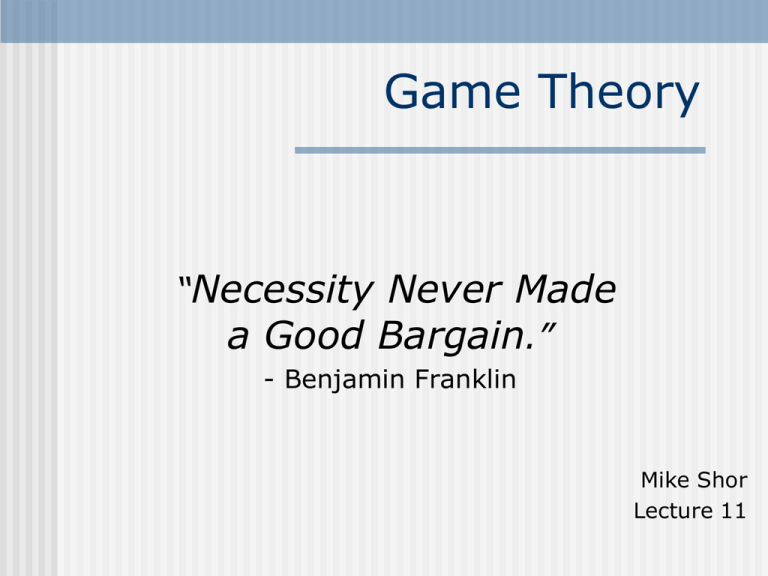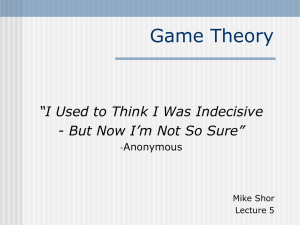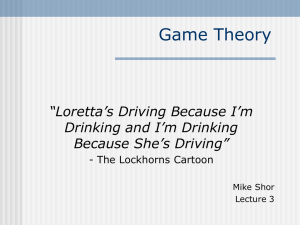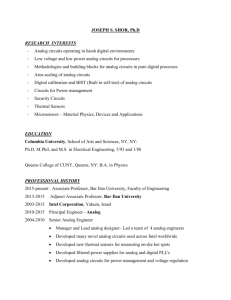Lecture Notes
advertisement

Game Theory “Necessity Never Made a Good Bargain.” - Benjamin Franklin Mike Shor Lecture 11 The Bargaining Problem If an owner of some object values it less than a potential buyer, there are gains from trade A surplus is created Example: I value a car that I own at $1000. If you value the same car at $1500, there is a $500 gain from trade Well-established market prices often control the division of surplus If such cars are priced at $1200: $200 to the seller $300 to the buyer Game Theory - Mike Shor 2 The Bargaining Problem In the absence of markets bargaining Bargaining Problem Determining the actual sale price or surplus distribution in the absence of markets Home sales “Comps” are rarely truly comparable Labor/management negotiations Surplus comes from production Game Theory - Mike Shor 3 The Bargaining Problem Importance of rules: The structure of the game determines the outcome Diminishing pies The importance of patience Screening and bargaining Game Theory - Mike Shor 4 Take-it-or-leave-it Offers Consider the following bargaining game for the used car: I name a take-it-or-leave-it price. If you accept, we trade If you reject, we walk away Under perfect information, there is a simple rollback equilibrium Game Theory - Mike Shor 5 Take-it-or-leave-it Offers accept p-1000 , 1500-p reject 0,0 p Game Theory - Mike Shor 6 Rollback Consider the subgame: •Accept: p-1000 , •Reject: 0 , 1500-p 0 You will reject if p>1500, accept otherwise Rollback: I will offer highest acceptable price of 1500 What if you make the take-it-orleave-it offer? Game Theory - Mike Shor 7 Take-it-or-leave-it Offers Simple to solve Unique outcome Unrealistic Ignore “real” bargaining Assume perfect information • We do not necessarily know each other’s values for the car Not credible • If you reject my offer, will I really just walk away? Game Theory - Mike Shor 8 Counteroffers and Diminishing Pies In general, bargaining takes on a “take-it-or-counteroffer” procedure Multiple-round bargaining games If time has value, both parties prefer trade earlier to trade later E.g. Labor negotiations – later agreements come at a price of strikes, work stoppages, etc. Game Theory - Mike Shor 9 Two-stage Bargaining Value of car: $1000 me, $1500 you I make an offer in period 1 You can accept the offer or reject it If you reject, you can make a counteroffer in the second period. Payoffs • In first period: p-1000,1500-p • In second period: (p-1000) , (1500-p) Game Theory - Mike Shor 10 Rollback What happens in period 2? In the final period, this is just like a leave-it-or-take-it offer: You will offer me the lowest price that I will accept, p=1000 This leaves you with 500 • (1500-p)= (1500-1000) and leaves me with 0 What do I do in the first period? Game Theory - Mike Shor 11 Rollback Give you at least as much surplus Your surplus if you accept in the first period is 1500-p Accept if: p = 1500-500 Note: the more that you value the future, the less you pay now! Your surplus in first period Your surplus in second period 1500-p 500 p 1500-500 Game Theory - Mike Shor 12 Example If =4/5 Period 2: You offer a price of 1000 • You get • I get (4/5) (1500-1000) 0 = 400 =0 In the first period, I offer 1100 • You get • I get (1500-1100) (1100-1000) Game Theory - Mike Shor = 400 = 100 13 First or Second Mover Advantage? In the previous example, second mover gets more surplus What if =2/5? Period 2: You offer a price of 1000 • You get • I get (2/5)(1500-1000) 0 = 200 =0 In the first period, I offer 1300 • You get • I get (1500-1300) (1300-1000) Game Theory - Mike Shor = 200 = 300 14 First or Second Mover Advantage? Who has the advantage? Depends on the value of the future! If players are patient: • Second mover is better off! • Power to counteroffer is stronger than power to offer If players are impatient • First mover is better off! • Power to offer is stronger than power to counteroffer Game Theory - Mike Shor 15 Bargaining Games With Diminishing Pies More periods with diminishing pies Suppose the same player makes an offer in each period Infinite number of periods Same point: if players are fully informed, a deal should occur in the first round! Game Theory - Mike Shor 16 Information COMMANDMENT In any bargaining setting, strike a deal as early as possible! Why doesn’t this happen? • “Time has no meaning” • Lack of information about values! • Reputation-building in repeated settings! Game Theory - Mike Shor 17 Examples British Pubs and American Bars Civil Lawsuits • If both parties can predict the future jury award, can settle for same outcome and save litigation fees and time • If both parties are sufficiently optimistic, they do not envision gains from trade Game Theory - Mike Shor 18 Uncertainty I: Civil Trial Plaintiff sues defendant for $1M Legal fees cost each side $100,000 If each agrees that the chance of the plaintiff winning is ½: • Plaintiff: • Defendant: $500K-$100K = $ 400K -$500K-$100K = $-600K If simply agree on the expected winnings, $500K, each is better off Game Theory - Mike Shor 19 Civil Trial What if both parties are too optimistic? Each thinks that their side has a ¾ chance of winning: • Plaintiff: • Defendant: $750K-$100K = $ 650K -$250K-$100K = $-350K No way to agree on a settlement! “Delicate Disclosure Game” Game Theory - Mike Shor 20 Uncertainty II: Non-monetary Utility Labor negotiations are often a simple game of splitting a known surplus Company will profit $200K – how much of this goes to labor? Rules of the bargaining game uniquely determine the outcome if money is the only consideration Game Theory - Mike Shor 21 Non-monetary Utility Each side has a reservation price • Like in civil suit: expectation of winning The reservation price is unknown One must: • Consider non-monetary payoffs • Probabilistically determine best offer • But – probability implies a chance that no bargain will be made Game Theory - Mike Shor 22 Example: Uncertain Company Value Company annual profits are either $150K or $200K per employee Two types of bargaining: • Union makes a take-it-or-leave-it offer • Union makes an offer today. If it is rejected, the Union strikes, then makes another offer A strike costs the company 20% of annual profits Game Theory - Mike Shor 23 Take-it-or-leave-it Offer Probability that the company is “highly profitable,” i.e. $200K is p If offer wage of $150 • Definitely accepted • Expected wage = $150K If offer wage of $200K • Accepted with probability p • Expected wage = $200K(p) Game Theory - Mike Shor 24 Take-it-or-leave-it Offer Example I p=9/10 • 90% chance company is highly profitable Best offer: Ask for $200K wage Expected value of offer: (.9)$200K = $180K But: 10% chance of No Deal! Game Theory - Mike Shor 25 Take-it-or-leave-it Offer Example II p=1/10 • 10% chance company is highly profitable Best offer: Ask for $150K wage If ask for $200K Expected value of offer: (.1)$200K = $20K If ask for $150K, get $150K Game Theory - Mike Shor 26 Two-period Bargaining If first-period offer is rejected: A strike costs the company 20% of annual profits Note: strike costs a high-value company more than a low-value company! Use this fact to screen! Assume (for simplicity): A strike doesn’t cost the Union anything Game Theory - Mike Shor 27 Screening in Bargaining What if the Union asks for $170K in the first period? Low-profit firm ($150K) rejects High-profit firm must guess what will happen if it rejects: • Best case – Union strikes and then asks for only $150K • In the mean time – Strike cost the company $20K High-profit firm accepts Game Theory - Mike Shor 28 Separating Equilibrium Only high-profit firms accept in the first period If offer is rejected, Union knows that it is facing a low-profit firm Ask for $150K in second period Expected Wage: • $170K (p) + $150K (1-p) Game Theory - Mike Shor 29 What’s Happening Union lowers price after a rejection • Looks like “Giving in” • Looks like Negotiating Actually, the Union is screening its bargaining partner • Different “types” of firms have different values for the future • Use these different values to screen • Time is used as a screening device Game Theory - Mike Shor 30 Lessons Rules of the game uniquely determine the bargaining outcome Which rules are better for you depends on patience, information Delays are always less profitable But may be necessary to screen Game Theory - Mike Shor 31









